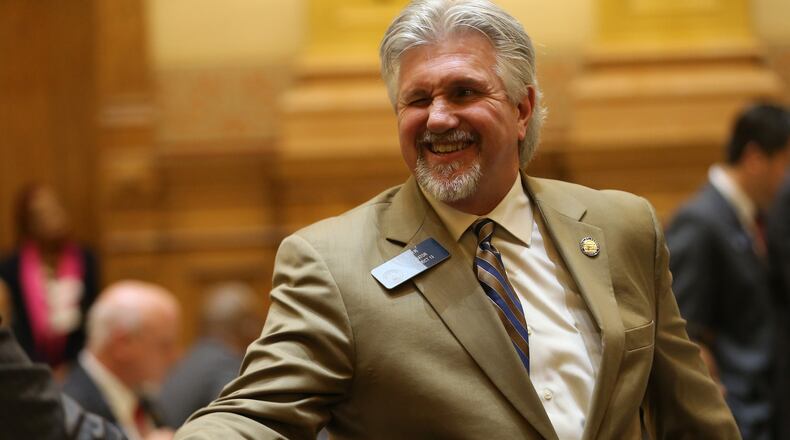Back when the Atlanta Braves announced they were heading to Cobb County, the team released a heat map showing its fans resided mainly in the Northern Arc.
The move touched off a Red State/Blue City debate that the team was turning its back on a liberal capital for the lure of conservative suburbia.
But thinking about it a bit more, it was simply a business decision by Liberty Media Inc.’s local subsidiary to move to metro Atlanta’s new Gay Belt, a network of ‘burbs stretching along I-285 from Smyrna to Sandy Springs east to Lilburn.
I know: you’re thinking, “Eh? Gay Belt? Smyrna?!?”
I thought the same thing until I noticed an interesting fact that emerged in the rumpus surrounding Georgia’s “religious liberty” bill: just 10 of the nearly 120 Republicans in the Georgia House voted against the measure, and five of those are from the emerging Gay Belt, which stretches from the Braves’ new ballpark to Gwinnett County.
Who are these five mavericks, these devil-may-care Repubs who went against the elephant herd in an election year? They are Rich Golick (from Smyrna), Joe Wilkinson (Sandy Springs), Tom Taylor (Dunwoody), Chuck Martin (Alpharetta) and B.J. Pak (Lilburn).
These brave legislators voted their conscience. They also voted so Georgia wouldn’t take the financial hits that other states have taken after passing religious liberty legislation.
Such bills are largely symbolic political ploys passed to address the growing worry that hetero-Americans will be forced to attend gay weddings and, by law, smile as they throw rice.
The Georgia law, as I understand it, allows religious people to frown while attending gay weddings. Or not even attend. Really, it says so.
“All individuals shall be free to attend or not attend, at their discretion, the solemnization of any marriage,” the law states, “in the exercise of their rights to free exercise of religion.”
I mean, think of it! Freedom from compulsory wedding attendance! It’s in the Bill if Rights somewhere.
‘A solution looking for a problem’
The bill has brought out an armada of business types saying it will make our commerce-loving state look backwards. Metro Atlanta Chamber is against it. Coke and Home Depot are against it. Seemingly every hipster with a beard and a start-up tech company is against it. So are the Falcons. And the Braves, who were once called by Georgia Voice, the gay newspaper, “by far, the most LGBT-inclusive of Atlanta’s men’s professional teams.”
The movie industry, which is about as gay-friendly a business as ever invented, an industry that has exploded in growth because of state tax breaks, is now threatening to turn off the klieg lights and stop blocking our streets and film elsewhere if Gov. Nathan Deal signs the bill into law.
Joe Wilkinson, a veteran lawmaker from Sandy Springs, called the bill “a solution looking for a problem.”
Sandy Springs has been metro Atlanta’s hot city, reeling in major corporate headquarters, and Wilkinson worries the bill will screw things up.
“I voted my conscience; I voted my district,” which he calls “moderate.”
As a sign of the kind of social change occurring, Sandy Springs councilman Andy Bauman this week proposed an ordinance prohibiting discrimination that includes sexual orientation. Bauman said he has received “overwhelming support” from constituents.
“This is an issue of conscience that transcends partisan politics,” he said.
‘A lot about business is image’
In Smyrna, in the shadow of the cranes building the Braves taxpayer funded stadium, the city council last year passed a bill extending health and other benefits to employees in legally recognized same-sex marriages. It was before the U.S. Supreme Court ruled making it the law of the land.
Former Councilman Wade Lnenicka, who pushed the bill, said Smyrna “was on the right side of history.” He said he introduced it “because, as a former Army Ranger, if I felt afraid to tackle the issue, then who would?”
Representative Pak, a devout Catholic and a lawyer who has handled religious liberty cases, said the bill’s language was confusing.
“It’s generally bad policy to allow discrimination against the LGBT community,” he said. “No matter what, there’s an appearance of some sort of discrimination. A lot about business is image and perception.”
Representative Taylor from Dunwoody called his constituents “financially conservative, socially moderate. They’re country club Republicans.”
The five House districts consist largely of transplants with professional jobs. Census figures show the districts are made up of one-third Georgia natives, about two-thirds with college degrees. They are mostly white and have higher than average median income.
‘Was this really necessary?’
Taylor recently stopped in at a local movie shoot and a producer told him that movie people are worried that the bill might hurt business.
“When you get down to it, was this really necessary?” Taylor asked.
His vote indicates he thought it was not.
I spoke with Matt Hennie, founder of Project Q Atlanta, who said it’s difficult to determine where gay population is growing. But he said the votes certainly indicate a moderation in the population’s thinking.
This all reminds me of a rainbow sign erected in Dunwoody a decade ago that caused a stir. The sign advertised “Adam and Steve’s Alternative Wedding Chapel.”
Turns out the sign was the work of April Fools pranksters. Or maybe they were just ahead of their time.
About the Author
The Latest
Featured


